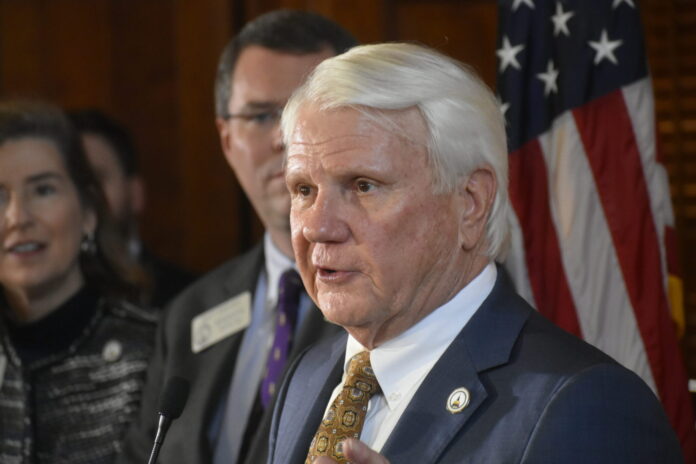
(GA Recorder) — On Wednesday, Georgia’s top Republican lawmakers detailed their 2024 legislative plans to lower income and property taxes and to give parents more tax relief.
Several Republican lawmakers joined House Speaker Jon Burns at the Capitol to discuss legislation that they contend will alleviate some of the financial burdens many Georgians are facing because of high inflation and rising home costs.
At a press conference, Burns credited the state’s conservative fiscal approach for allowing it to continue to seek out ways to keep reducing taxes for its residents. Burns also touted GOP Gov. Brian Kemp’s priority to reduce the flat income tax rate from 5.49% to 5.39%, which would eliminate $1 billion in tax collections for the state for the upcoming year.
If approved, the extra $1,000 child tax deduction would save about $54 for each child based on the current income tax rate.
“We’re doubling down on returning more money to Georgia taxpayers and delivering economic relief to families across our entire state by lowering taxes for parents, homeowners, small business owners, and all families in Georgia,” Burns said.
The Newington Republican is also backing a House bill that would double the state’s homestead tax exemption offered to homeowners, a measure that would reduce property tax bills by $100 million statewide.
Duluth Republican Rep. Matt Reeves plans to sponsor a bill that he said will update the current $2,000 state homestead exemption that has been in place for decades.
“It’s tough to buy homes as home values have risen, so doubling the homestead exemption from $2,000 to $4,000 gives homeowners more relief at a time when they need it a lot,” Reeves said.
In the state Senate, Lt. Gov. Burt Jones, a Butts County Republican, is endorsing a measure that could limit property tax increases. A Senate panel is scheduled to hold a hearing Monday on legislation that would cap at 3% the year-over-year rise in the amount used to calculate property taxes based on home valuations.
The Georgia Budget and Policy Institute contends further reductions in income and childcare taxes would provide some relief to Georgia residents, but the actual dollar savings will not bring much relief for their pocketbooks.
The nonprofit think tank continues to urge state officials to use a record $16 billion budget surplus to make significant investments in public needs like education, health care, and infrastructure.
“While those at the top of the economic ladder will see their incomes increase more substantially, most Georgians are unlikely to notice the impact of this change, which is estimated to save middle-income households an average of $34 over a full year,” GBPI senior fiscal analyst Danny Kanso wrote about Kemp’s upcoming budget plans. “This change will cost around $349 million annually. Expanding access to health care by closing the coverage gap through full Medicaid expansion or improving the quality of public schools by incorporating funding to address the effects of poverty could have a greater impact on most Georgia families at a similar cost.”






